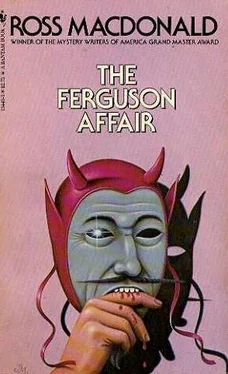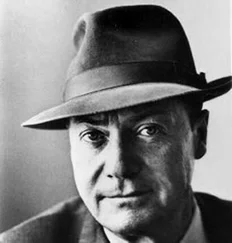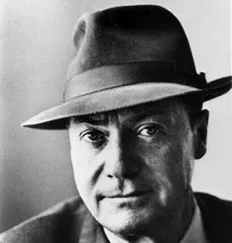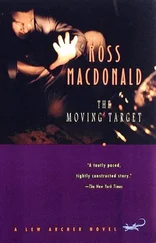“Against you?”
“No. Not against me. Against everybody.”
“You told him to go to hell.”
“You would have, too, if you’d heard him.”
“He upset you, didn’t he, William?”
“I don’t like my sleep to be interrupted by maniacs.”
“What did he say?”
“Nothing repeatable. Gibberish.”
She accepted my explanation, at least for the present. We went back to bed, and she dropped off again like a lamb. I lay awake for a long time beside her quiet breathing.
We had been married for nearly three years; tonight for the first time I was fully aware of her preciousness to me. But I was more determined than ever to stick with the case and do my duty in it. The problem was to know where my duty lay.
Blue dawn was at the window before I went to sleep. The Perrys’ radio woke me at seven o’clock. It nearly always did. They were a couple of schoolteachers who lived on schedule for the purpose of improving themselves. Their morning schedule began with setting-up exercises.
I flopped around on my side of the bed for a while, trying to shut out the announcer’s voice blaring through the wallboard. Finally I got up with that stiff gray insomniac feeling on my face. Sally went on sleeping like one of the seven sleepers.
Since she was sleeping for two, I dressed quietly and went downtown for breakfast. I bought a morning paper on the way. The front page carried a picture of Donato, a huddled figure with a shock of black Indian hair sticking out from under the sheet that covered him.
While I was waiting for my bacon and eggs, I read the accompanying news story. Granada was praised for his courage and marksmanship, and given credit for solving the series of burglaries. The story implied that the gang had other members besides Donato, but none of them was named, not even Gaines. I assumed that Wills was holding back, and had persuaded the local paper to go along.
The waitress brought my breakfast. The eggs stared up from the plate like wide yellow eyes. The toast had a gunpowder flavor. I caught myself sitting tensely in the booth like a condemned criminal waiting for the executioner to throw the switch.
It wasn’t purely empathy with Donato: I doubt that there’s such a feeling as pure empathy. For no clear reason, I’d put myself in the position of withholding information about a major crime. And the man whose request I was honoring wasn’t even a client.
I sat there trying to convince myself that Ferguson had been having alcoholic delusions about his wife. Or that the whole thing was a publicity hoax. Movie actresses didn’t get themselves kidnapped in Buenavista. Most of our crimes were done in the lower town, cheap fraud or senseless violence. But my mind couldn’t evade the connection between the Broadman killing and the Ferguson case. And I knew in my bowels that the threatening call at midnight had been no hoax.
I left the ugly eggs on my plate and went to the police station. Wills wasn’t in yet, but the sergeant on duty at the desk assured me that he would have the men in the patrol cars keep an eye on my home. By the time I had walked the several blocks to the office, past the familiar faces of the downtown buildings, I felt better. Nothing could happen to Sally in Buenavista.
My office was one of a suite of two, with an anteroom between, on the second floor of an old mustard-colored stucco court behind the post office. In the middle of the imitation flagstone courtyard there was a fountain, a dry concrete concavity inhabited by a lead dolphin which had long since emitted its last watery gasp.
I shared the suite and Mrs. Weinstein with another attorney, a middle-aged man named Barney Millrace who specialized in tax and probate work. We were not partners. I was on my way up, I hoped; Barney Millrace was on his way down, I feared. He was a quiet drinker, so quiet that I sometimes forgot about him for days.
Bella Weinstein never let me forget her. She was a widow, fortyish, dark, and intense, who had appointed herself my personal goad. She looked up from her desk when I walked into the anteroom. Fixing me with her eye, she said in a congratulatory way: “You’re early this morning, Mr. Gunnarson.”
“That’s because I’ve been up all night. Rampaging and carousing.”
“I bet. You have an appointment at nine-fifteen with Mrs. Al Stabile. I think she wants a divorce again.”
“I’ll head her off. Did she say why?”
“She didn’t go into the gory details. But I gather Stabile’s been rampaging and carousing again. You see where it leads. Also, a man named Padilla tried to reach you.”
“How long ago?”
“Just a few minutes. He left a number. Shall I call him back?”
“Right away, yes. I’ll take it inside.”
I closed the door of my office and sat down at the ancient golden-oak roll-top desk which I had imported at great expense from the Pennsylvania town where I was born. My father had willed it to me, along with the small law library which took up most of the shelves along one wall.
It’s oddly pleasing to sit at your father’s desk. Diminishing, too. It’s a long time before you begin to feel that you’re up to it. I was beginning.
Padilla was on the line when I lifted the receiver. “Mr. Gunnarson? I’m out at Colonel Ferguson’s. He says I got to make this fast.”
“What is it, Tony?”
“I don’t want to go into it over the phone. Can you come out here?”
“Why don’t you come to my office?”
“I would, but I hate to leave the Colonel. He needs somebody to hold his hand.”
“The hell I do,” I heard Ferguson say. Then his voice roared in my ear: “Get off the line!”
I got off the line, and started out through the anteroom. Mrs. Weinstein detained me with one of her complex looks; it combined satire, pathos, and despair.
“Are you going out, Mr. Gunnarson?” she said in her polite, furious monotone.
“Yes. Out.”
“But Mrs. Stabile will be here in a few minutes. What can I say to her?”
“Tell her I’ll see her later.”
“She’ll go to another lawyer.”
“No, she won’t. Stabile won’t let her.”
FERGUSON’S HOUSE WAS IMPRESSIVE by daylight, a green and gray modern structure of stone and wood and glass, distributed in unobtrusive low shapes which blended with the landscape and the seascape.
The door opened as my car entered the turnaround. Colonel Ferguson came out, trailed by Padilla. Padilla looked a little soiled and sallow, but he managed a smile. Ferguson was grimly unsmiling. The lines in his face were deep and inflexible. Heavy beard, jet black and pure white mixed, sprouted around the scab on his chin.
He came up to my car. “What in hell do you want?”
“I’m naturally worried about your wife-”
“It’s my affair. I’m handling it.”
I got out. “It’s my affair, too, whether I like it or not. You can’t expect me simply to sit by.”
“It’s what I have to do.”
“You haven’t had any further messages?”
“No. I’ll tell you this, though it’s none of your business. I’ve been in touch with the manager of the bank. They’ll have the money ready for me.”
“Since you’ve gone that far, don’t you think you should take the further step of going to the authorities?”
He bristled. “And get Holly killed?”
“You can go to them on the quiet, without any fanfare.”
“What good will that do, if her abductors have a pipeline to the police?”
“I don’t believe they have. They’re trying to scare you, paralyze you so you won’t act. I know the local police, as I told you last night. They’re a decent bunch.”
Padilla looked uneasy. I shared his feeling, to some extent, but suppressed it. Ferguson was listening to me, his long jaw calipered between thumb and fingers. I noticed that the nail of his thumb was bitten down to the raw.
Читать дальше












